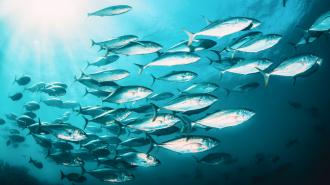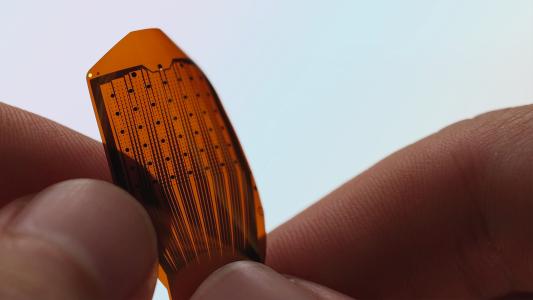When you order sea bass at a restaurant, how confident are you that the fish on your plate is really sea bass? After all, there’s a decent chance it’s actually giant perch.
Fraud is alarmingly common across the $150-billion global seafood industry. A 2019 report published by the marine conservation nonprofit Oceana found that 20 percent of about 450 fish products tested in the U.S. were mislabelled, with sea bass and snapper being two of the most commonly mislabeled species.
Estimates suggest that between 11% and 30% of seafood products are illegal, unreported, or unregulated in the US, where more than $2.4 billion of illegal seafood was consumed in 2019, according to a report from the United States International Trade Commission.
The problem starts with a lack of oversight early in the supply chain. Fishers and aquafarmers, most of whom live in developing nations, face little to no regulation over how seafood makes its way to buyers. This makes it easy for suppliers to make extra money by, say, claiming a shipment contains a more valuable species than it actually does.
Another challenge centers on the sheer quantity and variety of marine life. The global seafood market features more than 12,000 species, with many species appearing similar to each other, or appearing different as they age. (Compare seafood to the beef industry, which has various breeds but only one species: Bos taurus.) Given the complexity, it can be difficult for both suppliers and buyers to verify the authenticity of products.
Governments and consumers are increasingly demanding increased transparency and traceability in seafood, with some programs aiming to require traceability all the way from the grocery store back to the boat.
How do you achieve that across a massive, global industry? One solution lies in the blockchain project Fishcoin, which pays fishers and aquafarmers cryptocurrency when they report data online at various stages of the seafood supply chain.
“Within the next coming years, we’re gonna see traceability become the expectation in food and a lot of other products that receive ingredients from distant, fragmented supply chains,” Mark Kaplan, co-founder and partner of Envisible and Wholechain, told Freethink. “Blockchain can really change the status quo and as it gets more distributed and more understood, the industry will make it the norm.”
Establishing better incentives for supply-chain traceability could not only boost consumer confidence in seafood products, but could also help ensure that fishers and aquafarmers in developing nations are paid fairly for their work.
Watch the full episode on Fishcoin:
How Fishcoin works
Across the seafood supply chain, stakeholders are interested in several key data points: what the seafood product is and when and where it was caught. In developing nations, which is where 90% of the world’s seafood comes from, these data are usually recorded with pen and paper, meaning there are few ways to ensure the accuracy of the records.
“I would go to seafood processing facilities in and around [Indonesia], and often the paper comes in and I would joke that the ink is still wet,” Alistair Douglas, founder and partner of Eachmile Technologies, told Freethink.
Fishcoin adds economic incentives into the process. The Fishcoin app enables fishers to sell information about their catch — like species, quantity, and the date it arrived at the fishing facility — to potential buyers. This information lives on a shared ledger where it cannot be manipulated.
When a buyer decides to purchase the data, the fisher is immediately rewarded with cryptocurrency that’s pegged to the US dollar. That cryptocurrency can then be redeemed for things like grocery vouchers, mobile plan minutes, and credit toward utility bills.
Disincentivizing fraud
Fishcoin doesn’t solve every traceability problem in the seafood industry. The main drawback is that there’s no way to confirm that the information submitted by the fishers is totally accurate.
But the project does represent a first step in encouraging good-faith reporting in a notoriously fraudulent industry. And a major part of that first step is likely to be discouraging fraud during later stages of the supply-chain process.
For example, if suppliers and buyers were all using the same blockchain to monitor the flow of, say, tilapia through the supply chain, it would be difficult for someone in the middle of the chain to commit fraud. After all, everyone else on the Fishcoin app would be able to look up the product’s information, which cannot be changed after it’s submitted to the blockchain.
Beyond seafood, the Fishcoin model could be applied in other industries whose supply chains suffer from a lack of traceability, such as farming in developing nations. It could also help workers at the bottom of the supply chain earn more for their work.
Fish prices have been rising in recent decades. The Bureau of Labor Statistics reports that the prices of fresh fish and seafood in the US inflated nearly 100% from 2000 to 2022, significantly outpacing overall inflation. However, the profits from marked-up seafood rarely make it back to the people working on the boats or on the marine farms.
A 2020 study found that the average income of fishers ranked below the poverty line in one-third of nations with available data.
“[It’s] somewhat of a paradox that farmers and fishers would be the most food insecure people in the world, even though they are producing and feeding the world,” Kaplan told Freethink.
Fishcoin and similar traceability solutions bring new value to an ancient industry. As governments and consumers continue to demand supply-chain transparency, these models could deliver traceability to wealthier consumers while delivering digital currency to the people working hardest to feed the world.
“It’s really the necessity for feeding the world into the future, so blockchain is a critical capability for achieving sustainability,” Kaplan told Freethink.






